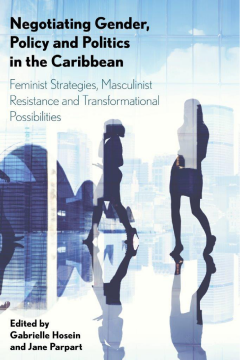
BOOK
Negotiating Gender, Policy and Politics in the Caribbean
Gabrielle Hosein | Jane Parpart
(2016)
Additional Information
Book Details
Abstract
Have efforts to advance women’s and men’s commitments to democratic governance, women’s rights and gender equality been successful in the Caribbean? Do they reflect local as well as international concerns and visions of gender equality?
This edited collection answers these questions by focusing on women’s political leadership, electoral quota systems, national gender policies and transformational leadership as four feminist strategies that aim to engender democracy and citizenship. It offers a rich historical, comparative and ethnographic
perspective on the lived experience of these strategies through case studies of Trinidad and Tobago, Guyana, Dominica, Jamaica and St. Lucia. Drawing on national policy debates, election campaigns, state officials’ solidarities, men’s gender consciousness and women leaders’ life histories across these five
Caribbean countries, the collection assesses the successes of transnational feminist efforts, the resilience of masculinist resistances, the limits of gender mainstreaming and the possibilities for gender justice in and beyond the Caribbean today.
Gabrielle Hosein is a Lecturer in the Institute for Gender and Development Studies at the University of the West Indies, St. Augustine Campus. She has published in Feminist Review and contributed chapters to edited collections.
Jane Parpart is Research Professor in the Department of Conflict Resolution, Human Security, and Global Governance at McCormack Graduate School in the University of Massachusetts, Boston. She is coeditor with Marysia Zalewski of Rethinking the Man Question: Sex, Gender and Violence in International
Relations (2008), and co-author of Women, Employment and the Family in the International Division of Labour (2013)
This carefully researched and edited book is one of the first to look at feminist mobilization strategies around political representation and women’s rights policy reform in the Anglophone Caribbean. It effectively also brings to the fore issues of masculinist resistance and the problem of women’s political inclusion on masculinist terms. This fascinating volume contributes significantly to understandings of global patterns of women’s political advancement. It will be of great interest to scholars, students, policy makers, and activists concerned with women’s status in the region and around the world.
Aili Mari Tripp, Professor of Political Science and Evjue Bascom Professor of Gender and Women's Studies, University of Wisconsin-Madison, USA
Twenty years after the Fourth World Conference on Women presents an opportune occasion to ask, “Wither gender?” Negotiating Gender, in substance, poses this question and answers with empirical precision and political intentionality. The text is an evidence based engagement with some of the key categories of gender equity – e.g. transformational leadership, gender policies, and electoral quota systems. Regional in scope, each chapter inhabits a feminist tenacity that insists on the pursuit of gender just change. The book’s contributors present a clear understanding of the complexities of change, as well as a sustained belief in the region’s capacity to change.
Michelle V Rowley, Associate Professor to the Women’s Studies Department, University of Maryland, USA; author of Feminist Advocacy and Gender Equity in the Anglophone Caribbean
Negotiating Gender, Policy and Politics in the Caribbean is a trenchant record of policy gains, political milestones and patriarchal challenges in women’s struggle for transformational leadership in the Caribbean for over three decades. Excavating state and civil engagements, this book discloses lessons for global dialogues while providing a manifesto for continued Caribbean power broking in gender equity.
Patricia Mohammed, Professor of Gender and Cultural Studies and the Campus Co-ordinator, School for Graduate Studies and Research, University of the West Indies, St. Augustine, Trinidad
By relying heavily on regional insights, theoretical formulations and the experience of direct feminist state engagement of gender experts such as Barriteau, Patricia Mohammed, Linnette Vassal and Rawwida Baksh among others, the book signals a coming of age of indigenous Caribbean ideas in feminist and gender scholarship to matters that pertain to gender mainstreaming and gender policy in the Region.
Table of Contents
| Section Title | Page | Action | Price |
|---|---|---|---|
| _GoBack | 1 | ||
| GoBack | 18 | ||
| _GoBack | 107 | ||
| _TOC66163 | 118 | ||
| _TOC68265 | 118 | ||
| _TOC71685 | 119 | ||
| _TOC74224 | 120 | ||
| _TOC74297 | 120 | ||
| _TOC79034 | 122 | ||
| _GoBack | 131 | ||
| _GoBack | 173 | ||
| _TOC28680 | 177 | ||
| _TOC35780 | 178 | ||
| TOC340587804 | 178 | ||
| _TOC85200 | 183 | ||
| _TOC90604 | 183 | ||
| _TOC95338 | 184 | ||
| _TOC103802 | 186 | ||
| _TOC109259 | 187 | ||
| _TOC109302 | 187 | ||
| TOC375457092 | 187 | ||
| TOC375457093 | 189 | ||
| _TOC150790 | 190 | ||
| _GoBack | 211 | ||
| _GoBack | 215 |
